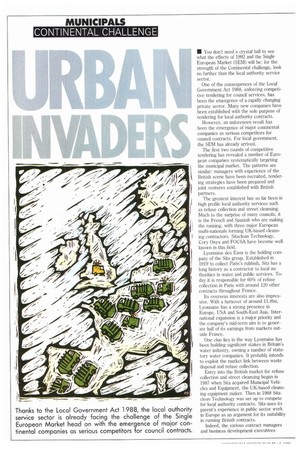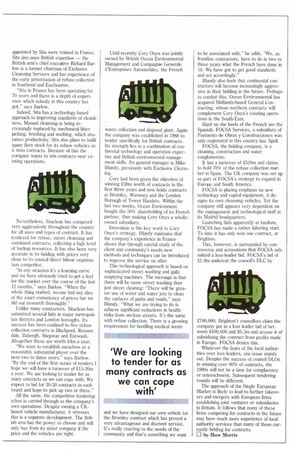MUNICIPALS CONTINENTAL CHALLENGE
Page 30

Page 31

If you've noticed an error in this article please click here to report it so we can fix it.
• You don't need a crystal ball to see what the effects of 1992 and the Single European Market (SEM) will be: for the strength of the Continental challenge, look no further than the local authority service sector.
One of the consequences of the Local Government Act 1988, enforcing competitive tendering for council services, has been the emergence of a rapidly changing private sector. Many new companies have been established with the sole purpose of tendering for local authority contracts.
However, an unforeseen result has been the emergence of major continental companies as serious competitors for council contracts. For local government, the SEM has already arrived.
The first two rounds of competitive tendering has revealed a number of European companies systematically targeting the municipal market. The patterns are similar: managers with experience of the British scene have been recruited, tendering strategies have been prepared and joint ventures established with British partners.
The greatest interest has so far been in high profile local authority services such as refuse collection and street cleansing. Much to the surprise of many councils, it is the French and Spanish who are making the running, with three major European multi-nationals forming UK-based cleansing contractors. Sitaclean Technology, Cory Onyx and FOCSA have become well known in this field.
Lyonnaise des Eaux is the holding company of the Sita group. Established in 1919 to collect Paris's rubbish, Sita has a long history as a contractor to local authorities in water and public services. Today it is responsible for 60% of refuse collection in Paris with around 120 other contracts throughout France.
Its overseas interests are also impressive. With a turnover of around g1.8bn, Lyonnaise has a strong presence in Europe, USA and South-East Asia. International expansion is a major priority and the company's mid-term aim is to generate half of its earnings from markets outside France.
One clue lies in the way Lyonnaise has been building significant stakes in Britain's water industry, owning a number of statutory water companies. It probably intends to exploit the market link between waste disposal and refuse collection.
Entry into the British market for refuse collection and street cleansing began in 1987 when Sita acquired Municipal Vehicles and Equipment, the UK-based cleansing equipment maker. Then in 1988 Sitaclean Technology was set up to compete for local authority contracts. Sita uses its parent's experience in public sector work in Europe as an argument for its suitability in running British contracts.
Indeed, the various contract managers and business development executives appointed by Sita were trained in France. Sita also uses British expertise — the British arm's chief executive Richard Barlow is a former chairman of Exclusive Cleansing Services and has experience of the early privatisation of refuse collection in Southend and Eastbourne.
"Sita in France has been operating for 70 years and there is a depth of experience which nobody in this country has got," says Barlow.
Indeed, Sita has a technology-based approach to improving standards of cleanliness. Manual cleansing is being increasingly replaced by mechanical litter picking, brushing and washing, which also raises productivity. Sita also plans to build spare fleet stock for its refuse vehicles as it wins contracts. Because of this the company wants to win contracts near existing operations.
Nevertheless, Sitaclean has competed very aggressively throughout the country for all sizes and types of contract. It has tendered for refuse, street cleansing and combined contracts, reflecting a high level of backup resources. It has also been very accurate in its bidding with prices very close to its council direct labour organisation competitor.
"In any situation it's a learning curve and we have obviously tried to get a feel for the market over the course of the last 12 months," says Barlow. "When the whole thing started, no-one had any idea of the exact consistency of prices but we did our research thoroughly."
Unlike many contractors, Sitaclean has submitted several bids in major metropolitan districts and London boroughs. Its success has been confined to five refuse collection contracts in Blackpool, Rossendale, Babergh, Shepway and Erewash. Altogether these are worth £4m a year.
"We want to establish ourselves as a reasonably substantial player over the next two to three years," says Barlow. "By the end of the first series of tenders I hope we will have a turnover of 215-20m a year. We are looking to tender for as many contracts as we can cope with. We expect to bid for 20-30 contracts in each round and hope to pick up two or three."
All the same, the competitive tendering ethos is carried through to the company's own operations. Despite owning a UKbased vehicle manufacturer, it stresses this is a separate development. The British arm has the power to choose and will only buy from its sister company if the price and the vehicles are right. Until recently Cory Onyx was jointly owned by British Ocean Environmental Management and Compagnie Generale d'Entreprises Automobiles, the French waste collection and disposal giant. Again the company was established in 1988 to tender specifically for British contracts. Its strength lies in a combination of continental technology and operation expertise and British environmental management skills. Its general manager is Mike Blundy, previously with Exclusive Cleansing.
Cory had been given the objective of winning E30rn worth of contracts in the first three years and DOW holds contracts at Bromley, Waveney and the London Borough of Tower Hamlets. Within the last two weeks, Ocean Environment bought the 50% shareholding of its French partner, thus making Cory Onyx a whollyowned subsidiary.
Innovation is the key word to Cory Onyx's strategy. Blundy maintains that the company's experience in France shows that through careful study of the client and community's needs new methods and techniques can be introduced to improve the service on offer.
This technological approach is based on sophisticated street washing and gully emptying machines. The message is that there will be more street washing than just street cleaning: "There will be greater use of water and water jets to clean the surfaces of paths and roads," says Blundy. "What we are trying to do is achieve significant reductions in health risks from unclean streets. It's the same with refuse collection. There is a growing requirement for handling medical waste and we have designed our own vehicle for the Bromley contract which has proved a very advantageous and discreet service. It's really reacting to the needs of the community and that's something we want to be associated with," he adds. "We, as frontline contractors, have to do in two to three years what the French have done in 10. We have got to get good standards and act accordingly."
Blundy also feels that continental contractors will become increasingly aggressive in their bidding in the future. Perhaps to combat this, Ocean Environmental has acquired Midlands-based General Contracting, whose northern contracts will complement Cory Onyx's existing operations in the South-East.
Hard on the heels of the French are the Spanish. FOCSA Services, a subsidiary of Forrnento de ()bras y Construcciones was only registered in this country last April.
FOCSA, the holding company, is a cleaning, construction and water conglomerate.
It has a turnover of .2520rn and claims to hold 70% of the refuse collection market in Spain. The UK company was set up as part of FOCSA's strategy to expand in Europe and South America.
FOCSA is placing emphasis on new technology and capital equipment, it designs its own cleansing vehicles. Yet the company still appears very dependent on the management and technological staff at its Madrid headquarters.
Launching bids apparently at random, FOCSA has made a rather faltering start. To date it has only won one contract, at Brighton.
This, however, is surrounded by controversy and accusations that FOCSA submitted a loss-leader bid. FOCSA's bid of £1.9m undercut the council's DLC by £700,000. Brighton's councillors claim the company put in a loss leader bid of between £400,000 and £0.5m and accuse it of subsidising the contract from profits made in Europe. FOCSA denies this.
Whatever the fears of the local authorities over loss leaders, one issue stands out. Despite the success of council DLOs in winning over 80% of contracts, the 1990s will not be a time for complacency or retrenchment. Subsequent tendering rounds will be different.
The approach of the Single European Market is likely to lead to further takeovers and mergers with European firms establishing joint ventures or subsidiaries in Britain. It follows that many of these firms competing for contracts in the future may have much more experience of local authority services than many of those currently bidding for contracts.
LI by How Morris








































































































